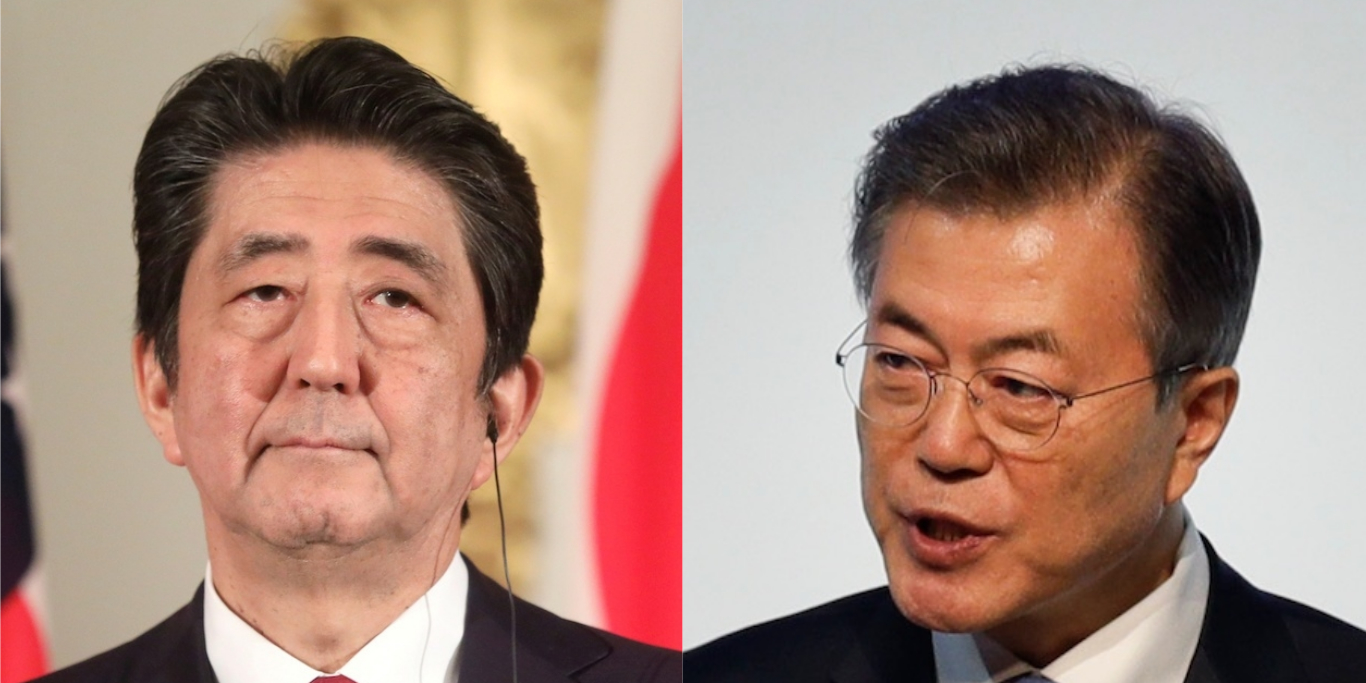- South Korea and Japan have been mired in their own trade war since early July.
- It dramatically escalated on Friday after Japan said it would remove South Korea from its whitelist of favored economic partners.
- This means Japanese exporters will have to go through additional screening to make sure their goods don’t benefit South Korea’s military or weapons industry.
- Hours later, South Korea retaliated by removing Japan from its whitelist of preferred trading partners as well.
- The latest trade barbs reignite decades of tensions between the two countries. Japan colonized South Korea in 1910 and ruled it with an iron fist until the end of World War II.
- Visit Business Insider’s homepage for more stories.
South Korea and Japan’s trade war just got a lot worse after the two countries dropped each other from their list of trusted economic partners, further reigniting their decades-long political and economic tensions.
The Japanese government on Friday announced its decision to remove South Korea from its so-called “whitelist” of favored trading partners.
This means that Japanese exporters of “strategic” goods will need to obtain more permits and go through additional screening to make sure their products are not being used by South Korea’s military or weapons industry, Reuters reported. These new restrictions will go into effect on August 28.
Hiroshige Seko, Japan’s trade minister, stressed on Friday that this “is not an export ban.”
This is the first time Japan has removed any country from its whitelist, which currently includes Western countries including the UK, US, and Germany, Reuters reported.

Hours later, South Korea retaliated by also announcing plans to remove Japan from its own whitelist of 29 preferred trading partners, Agence France-Presse, The Associated Press (AP), and Reuters reported.
South Korean officials didn't specify what this means, but said it will provide more details next week, the AP said.
South Korea will also speed up its efforts to file a complaint with the World Trade Organization over Japan's export controls, finance minster Hong Nam-ki said, according to Reuters.

Japan on July 1 had already placed export curbs on fluorinated polyimide, photoresists, and hydrogen fluoride - three key high-tech materials that South Korea's massive domestic electronic industry needs to make semiconductors and display screens.
That move has further hammered the global supply chain for tech goods, which already faces uncertainty due to the ongoing trade war between the US and China.
President Moon Jae-in told an emergency cabinet meeting on Friday: "The step taken by Japan today is something that impairs the longstanding economic cooperation and friendly partnership between our two countries, posing a grave challenge to the bilateral relationship."
"Moreover, it is a selfish, destructive act that will cripple the global supply chain and wreak havoc on the global economy," he added. "It is sure to draw condemnation from the international community."
Moon added that his government would "provide assistance in every way possible to minimize damage to businesses" in light of the Japanese export curbs.

Unraveling decades of mistrust
The latest developments come after weeks of economic uncertainty and finger-pointing between the two countries, reigniting decades of moldering political tensions.
Earlier on Friday, Trade Minister Seko said Japan's cabinet had decided to remove South Korea from its whitelist on national security grounds, and blamed Seoul for eroding trust between the two countries.
"We want South Korea to first create an environment in which we can have dialogue with trust," Seko said, according to Reuters. "It's South Korea's responsibility to do that."

Late last year South Korea's Supreme Court angered Tokyo by ordering Japanese companies to repay Koreans who were forced to work for them during World War II. Many Japanese companies, such as Mitsubishi Heavy Industries, refused to comply.
Japan colonized the Korean Peninsula - which at the time was still unified - in 1910, and ruled it with an iron fist until the end of World War II.
The two countries normalized diplomatic relations in a 1965 pact that saw Tokyo give Seoul grants worth $300 million and loans of $200 million over ten years.
The Japanese government maintains that the 1965 treaty had settled all colonial-era debts.
However, later South Korean governments said that while the pact did cover some wartime debts, it did not include some key recipients, such as forced laborers or "comfort women" - Korean women forced to provide sex for Japanese troops.
"We will never again lose to Japan," South Korean President Moon Jae-in told his cabinet on Friday in a thinly-veiled reference to Japan's colonization.

Over the past few weeks people in South Korea have called for a boycott on Japanese goods to retaliate against the trade war. Japanese films and beer sales in South Korea have already suffered.
A 72-year-old South Korean man set himself ablaze in central Seoul on Thursday, becoming the second person in the country in two weeks to use self-immolation to protest the two counties' soured relations.
Police found in the 72-year-old man's bag a leaflet criticizing Tokyo's July 1 decision to tighten exports on hi-tech materials, the AP reported.

On Thursday, US Secretary of State Mike Pompeo said he hoped Japan and South Korea - both key US allies - would "find a way to move forward together."
Top US, Japanese, and South Korean diplomats met on Friday to discuss whether the US could mediate between the two countries.
Experts previously noted that Washington could help break the deadlock as both Japan and South Korea have good diplomatic relations with the US.

